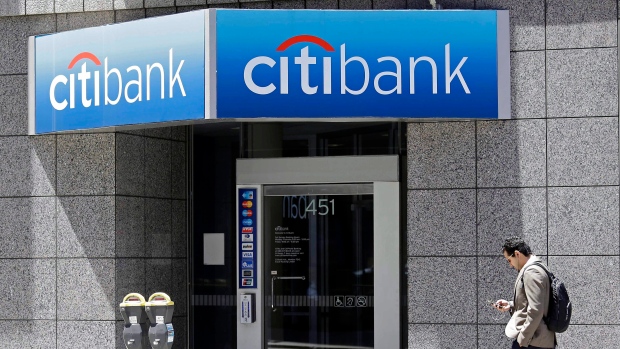Apr 15, 2019
Citi shares slump after revenue growth stalls in consumer unit
, Bloomberg News

An unexpected bounce in bond trading wasn’t enough to counter a lack of growth in Citigroup Inc.’s sprawling consumer division.
Shares declined after revenue was little changed in the firm’s global consumer bank, an area where shareholders have been told to watch for acceleration this year. The number of open accounts in Citigroup’s U.S. retail banking division hasn’t increased in the past year, while average deposits for the unit climbed only 1 per cent.
Citigroup has spent years expanding its credit-card offerings and retail-banking services, so the division’s slowing revenue growth has been a source of frustration. Last week, the company’s president, Jamie Forese, said he was leaving the company. He struggled to have his voice heard on strategy for the division, which offers retail products across 19 countries, a person familiar with the matter told Bloomberg at the time.
Citigroup shares declined 0.3 per cent to US$67.20 at 11:37 a.m. in New York. They have gained 29 per cent this year, compared with a 15 per cent increase in the KBW Bank Index.
Still, Chief Executive Officer Michael Corbat said on Monday that the firm’s strategy for its U.S. consumer unit was “showing good early results” after the firm introduced new products in recent quarters. Excluding gains from the sale of the Hilton Worldwide Holdings Inc. credit-card portfolio a year earlier, the unit’s revenue climbed 4 per cent.
The bank rolled out a national digital-banking franchise and debuted a high-yield savings account to attract customers outside its core metropolitan areas. The firm also introduced new personal loan products for card customers.
“Our digital sales deposits grew by US$1 billion -- that’s both new to bank customers as well as to existing customers,” Chief Financial Officer Mark Mason said on a conference call with reporters Monday morning. “We’re actually very pleased with the progress that we’re seeing. That US$1 billion of deposits through our digital channel is the equivalent of all that we did last year in 2018. So very good take-up in terms of those capabilities and deposit growth there.”
In a potentially foreboding sign for the division, Citigroup set aside US$1.98 billion to cover souring consumer loans during the first quarter as the unit’s net credit losses climbed 10 per cent. Card loans are “seasoning” in the U.S., the bank said, using an industry term signifying some increase was to be anticipated after a period in which the bank signed up more borrowers. Citigroup has said it plans to use its status as the world’s largest credit-card issuer to sell customers other products and services, such as online checking accounts.
The bank’s fixed-income, currencies and commodities traders managed to boost revenue 1 per cent from a year earlier, withstanding a slump that ensnared rivals JPMorgan Chase & Co. and Goldman Sachs Group Inc. FICC traders generated US$3.45 billion, countering disappointing results from their colleagues in equities, where revenue slumped 24 per cent to US$842 million. Combined, trading was down 5.2 per cent.
Citigroup credited resilient demand for spread products, but said it also fared well with products tied to interest rates -- a category JPMorgan said last week suffered from lower investor activity. That helped Citigroup’s fixed-income unit narrow the gap with JPMorgan’s franchise, which still ranks No. 1.
“We saw continued strength inside of our FICC business, particularly around rates as a bit more certainty around the direction of rates started to play out,” Mason said on Monday. “And we saw good corporate client activity in G-10 rates specifically. So the combination of that activity in basically the final two weeks of the quarter really aided in what we were able to deliver.”
Here are other highlights from Citigroup’s results:
-Net income climbed 2 per cent to US$4.71 billion, or US$1.87 a share. That topped the US$1.80 average of analyst estimates compiled by Bloomberg. Firmwide revenue during the first quarter slipped 2 per cent to US$18.58 billion, in line with analysts’ estimates.
-Costs fell 3 per cent to US$10.58 billion, a bigger drop than analysts had expected.
-Total revenue from investment banking amounted to US$1.35 billion.
-Debt underwriting brought in US$804 million, a 15 per cent increase that topped estimates and countered weakness from the equity capital markets division.
-Advisory revenues surged 76 per cent to US$378 million, compared with the US$307 million analysts projected.
-The firm’s efficiency ratio -- a key measure of profitability that shows how much it costs to produce a dollar of revenue -- improved to 57 per cent. It was 57.8 per cent in the final months of last year.


